
Max Lamb at Johnson Trading Gallery
A solo exhibition by British designer Max Lamb has opened at Johnson Trading Gallery in New York, featuring a new series of furniture cut from solid rock.
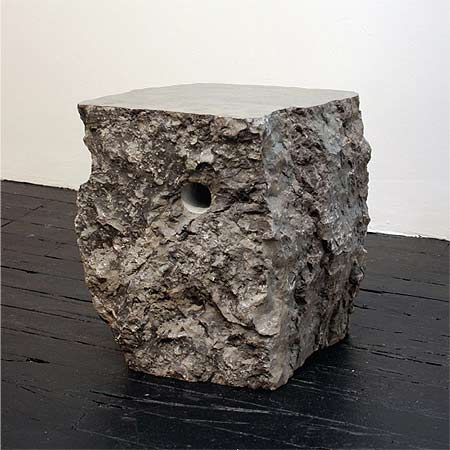
The rock chairs are made of a stone called Delaware Bluestone. Top image: Delaware Bluestone Chair (no. 1 ). Above: La Cernia Table
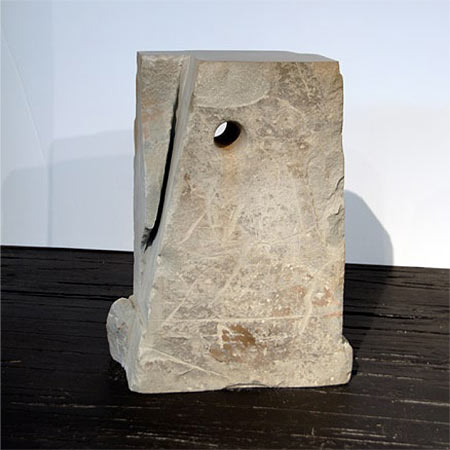
The exhibition runs until 7 November at Johnson Trading Gallery, 490 Greenwich Street, New York 10013. Above: Delaware Bluestone Sidetable. The following is from Johnson Trading Gallery:
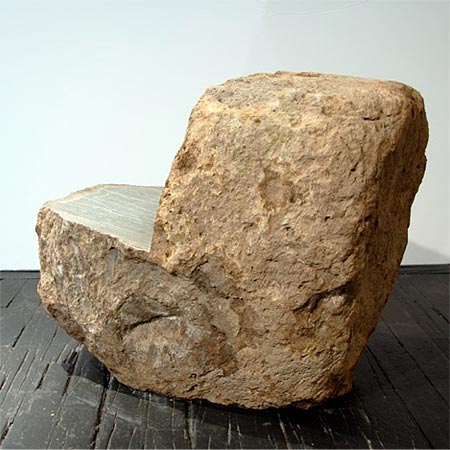
Above: Delaware Bluestone Chair (no. 4 ) Below: Delaware Bluestone Chair (no. 3 )
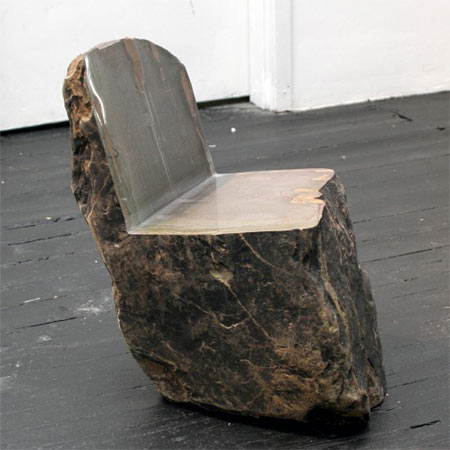
The following is from Johnson Trading Gallery:
--
MAX LAMB OPENS AT JOHNSON TRADING GALLERY FURNITURE IN STONE, BRONZE, PEWTER, COPPER, AND POLYSTYRENE
New York Show Marks U.S. Debut Combining High Tech with Hand Hewn
Johnson Trading Gallery presents the first U.S. exhibition of contemporary furniture by British designer Max Lamb.
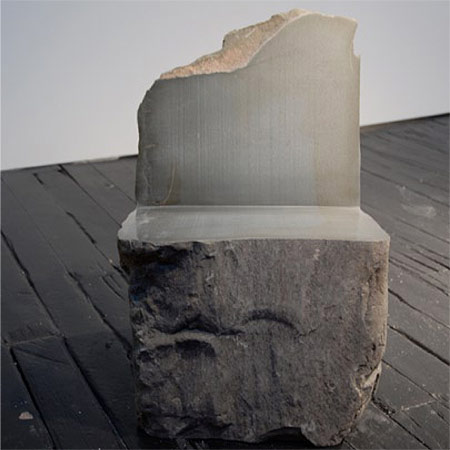
The exhibition features new commissions Lamb has crafted from New York bluestone, along with a retrospective of important limestone, pewter, bronze, copper, wool felt, and polystyrene objects, demonstrating why his work has captured the attention of the international design community. Above: Delaware Bluestone Chair (no. 2 )
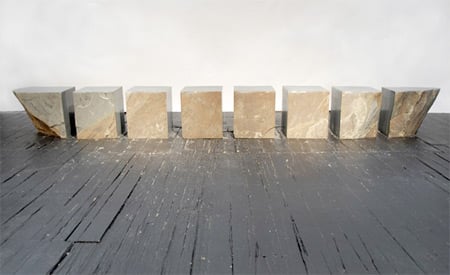
A series of films will offer an understanding of Lamb’s design philosophy and processes. The exhibition will be on view from October 8 through November 9, at Johnson Trading Gallery, 490 Greenwich Street, New York City. Above: Delaware Bluestone Slice Bench (no. 1 )
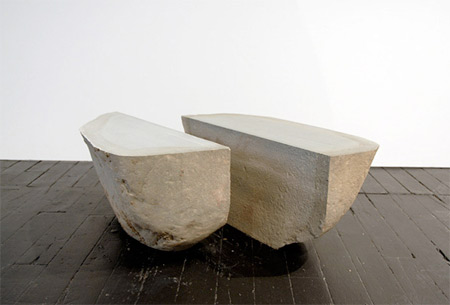
One of a group of dynamic young British designers who are leading the pack internationally, Lamb was featured as one of four Designers of the Future at Design Miami/Basel 2008. He is known for the creative vision he brings to contemporary furniture design, for his high level of technical skill, and for his drive, as he explains, “to explore and re-contextualize both traditional and unconventional materials, celebrating their inherent qualities, and to reconsider the function of all objects.” Above: Delaware Bluestone Twin Tables
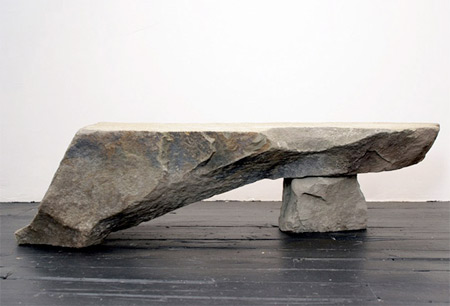
The new works in this exhibition, evolving from his previous collection ‘Exercises in Seating’, a consistent theme throughout his career, exemplify Lamb’s skills as a designer, a craftsman, and an artist. For this exhibition, Max has created new works in Delaware Bluestone. A naturally blue sediment stone with a strong historic connection to New York, it is visible throughout the city’s sidewalks and architecture. Above: Delaware Bluestone Bench, Below: Delaware Bluestone Table
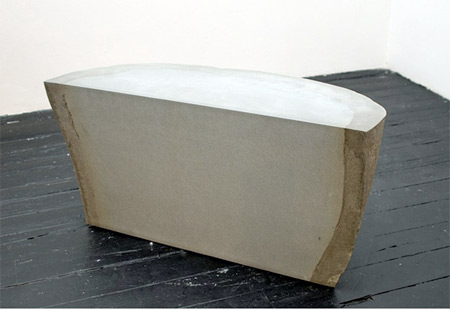
Bluestone, found predominantly in the Catskill Delta, was created over 350 million years ago from run-off from the Acadian Mountains, which covered the area where New York City now exists. Lamb traveled from London to the Catskills to search for suitable and inspiring pieces of stone from which to carve furniture. He collected stones from four bluestone quarries and worked directly with one, combining hand-carving and machine-cutting techniques to create a collection of chairs, tables, benches and stools. His previous stone work in limestone and sandstone, exhibited at Design Miami/ Basel 2008, along with early experiments in carving Cornish granite, advanced his well-honed skill set and his understanding of how to work with this heavy and difficult material.
The retrospective work in the exhibit includes a large, hand carved Polystyrene Dining Table and eight Poly Chairs, White Bronze Poly Chairs, a Nano crystal-line Copper Stool, and a collection of turned Concrete and Felt Stools from Lamb’s Solids of Revolution project developed for the 2008 Designer of the Future Award.
ABOUT MAX LAMB
Lamb notes, “My recent work has been very preoccupied with processes and materials, and alternative ways in which these can be manipulated, exploring the potential of local skill-based industries, combining skilled hand-craft techniques with native materials, and sometimes juxtaposing these with digital processes and the hightech.”
Graduating from Northumbria University with a degree in Three Dimensional Design in 2003, Lamb earned early recognition for his talent, receiving the 2003 Peter Walker Award for Innovation in Furniture Design and a 2004 Hettich International Design Award. Before launching his independent design practice in 2007, Lamb worked with Tom Dixon, designing furniture for his Special Project series. His career began as a design consultant for Ou Baholyodhin Studio, London, designing furniture, graphics, interior products, restaurants, shops, exhibitions, and residential interiors.
In 2006, he earned a Masters Degree in Design Products at the Royal College of Art, focusing on furniture forms and establishing a precise, process-driven approach to design. A strong international sensibility cultivated in travel to China, India, Nigeria, Japan and elsewhere, and an appreciation for natural materials, born of his love of the outdoors, infuse Lamb’s work. His pieces have been exhibited internationally, including Tokyo, Stockholm, Milan and London, as well as in Miami and Basel.
ABOUT JOHNSON TRADING GALLERY
Johnson Trading Gallery is committed to commissioning and funding unique contemporary works from emerging artists, designers and architects, and to curating exhibitions of the finest 20th Century design. Paul Johnson made his name as owner and operator of Phurniture Inc., founded in 2001. His extensive knowledge and vast collection of historical design, as well as his attraction to contemporary artists that push boundaries, proved invaluable to his future as design gallerist.
Operating now as Johnson Trading Gallery, the space aims to showcase rare works by established masters such as Paul Evans, George Nakashima, David Ebner and Mario Dal Fabbro, in addition to simultaneously creating an outlet for current commissioned artists Aranda/Lasch, Steven Holl and Joseph Heidecker. The result: an environment that serves as a contextualized timeline of historical precedence and modern technology.